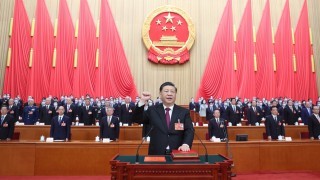Ask any insider in the foreign policy community in Washington, DC what the term “power broker” means, and the response will be a litany of information about how our President, the National Security Council, and State Department are working around the world to ensure US national security interests and concerns are met and the US retains it hegemonic status. They will confirm adamantly that the United States is the world leader in everything imaginable and that no country could successfully replace us. But is that the case today? Over the last few years foreign nations are paying closer attention to overtures from China’s CCP leadership and its overseas economic programs. Countries once firmly in the US camp are turning to Beijing to broker third party deals and help resolve their international conflicts. We are at war with China, but it is not a Westphalian concept of conflict.
Differing tools and methodologies make it “difficult for the West to admit it,” according to Michael Listner, founder of Space Law and Policy Solutions. General Laura Richardson, commander of the US Southern Command, in testimony before the House Armed Services Committee on Wednesday that “The [People’s Republic of China] has the capability to eschew international norms, advance its brand of authoritarianism, and amass power and influence at the expense of these [South American and Caribbean] democracies.”
General Glen VanHerck, commander of the US Northern Command and Richardson also testified this week saying that China’s expansion includes increased work on its Belt and Road Initiative (BRI) and other forms of economic coercion. Recently China completed the largest embassy in the world in the Bahamas and over 80% of Mexico’s telecommunications is provided by Chinese companies, according to VanHerck. The CCP leadership is active throughout the world. Behind-the-scenes in the Middle East this week, China helped broker a significant deal between Saudi Arabia and Iran to reestablish diplomatic relations. After the announcement, China’s senior diplomat declared that the two countries were wise to do so. It comes one month after President Ebrahim Raisi’s visit to Beijing.
China’s appearing to facilitate the negotiations adds to Chinese prestige, according to John Alterman, in of the Center for Strategic and International Studies (CSIS). He argues that “The not-so-subtle message that China is sending is that while the United States is the preponderant miliary power in the Gulf, China is a powerful and rising diplomatic presence… and it contributes to a narrative of a shrinking US global presence.” Washington does not maintain diplomat relations with Tehran and was unable to participate. China, in contrast, represents about 30% of Iran’s total international trade, with much of it in the form of oil exports to the communist giant. The exclusion of Washington by Saudi Arabia indicates they are seeking to diversity their security arrangements.
“Globalization is a fact, not a policy,” according to Condoleeza Rice, director of the Hoover Institution at Stanford University. But globalization is facing headwinds, she added. The strongest are coming from China where government leaders have failed to meet international expectations of liberalizing the country’s economy. When asked about China’s role in Africa, Rice said that its economic and political influence is beginning to wane in the region but that the United States needs to make sure it fills any gaps. “We ought to be right in the middle of that, going into that vacuum,” she argues. The question remaining is can Washington compete effectively and simultaneously in the current international economic climate and on the military front.
The Jamestown Foundation pointed out this week that outgoing Premier Li Keqiang announced that China would increase its defense budget by 7.2 percent in his remarks opening the annual National’s People’s Congress. Covell Meyskens, an associate professor of national security affairs at the Naval Postgraduate School, suggests that China is pushing hard to encourage the world to disengage with the United States. Writing in Foreign Policy, Meyskens argues that “… under Xi, China’s propaganda apparatus appears determined to tell “a good China story” that lauds how CCP rule, and especially Xi’s leadership, has generated a plethora of domestic accomplishments and raised China’s global clout. In recent years, Chinese state media has also worked hard to put to rest the idea that the PRC should take the United States as a model to emulate. Every day, Chinese media pumps out enormous volumes of content about why the United States is failing as a global leader.
Increasing Chinese aggression on the economic, diplomatic, and military fronts is a serious challenge to America’s global leadership role. Xi may see this as his last opportunity to alter the international order in China’s favor before Beijing is faced with overwhelming demographic and other domestic economic challenges that could impede his goals. Washington needs to recognize the international challenge it faces from China and arrive at a better understanding of how to deal with the belligerent communist giant.
Daria Novak served in the U.S. State Dept.
Photo: China Defence Ministry
